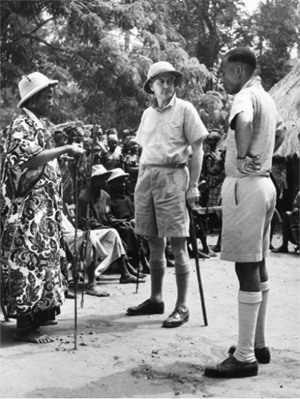Modeling Decolonization: Leaders and Followers in the Human Sciences at the End of Empire
What did the geopolitical rupture of decolonization mean for the human sciences? Treating Britain’s African colonies as a laboratory, Anglo-American researchers after 1945 inherited the problematics of the late imperial state and rethought theories of authority as a result. Specifically, the idea of leadership — which had an ambiguous meaning in classical sociology and was then conspicuously tarnished by fascism — was rehabilitated because of the need for subtle, flexible, and untraditional forms of political management as empires crumbled. An updated version of Max Weber’s famed charismatic leader achieved new currency as a counterpoint to various troublesome alternatives: the rigid hierarchies of indirect rule; the impersonal but disorienting transformations of modernization; and the threat of anticolonial struggle tipping into revolutionary disorder.
 Erik Linstrum is an Associate Professor at the University of Virginia and a historian of modern Britain in its imperial, European, and global contexts. His research explores the politics of knowledge and the circulation of information with particular interests in science and technology, war and violence, and the long history of decolonization. His first book, Ruling Minds: Psychology in the British Empire, won the George Louis Beer Prize of the American Historical Association for the best book of the year in European international history. His most recent book, Age of Emergency: Living with Violence at the End of the British Empire, traces reports of atrocities in Malaya, Kenya, and Cyprus as they circulated through British society after 1945: from the anticolonial left to the imperialist and fascist right, from Fleet Street to the Church of England, from BBC teleplays to the West End theatre scene.
Erik Linstrum is an Associate Professor at the University of Virginia and a historian of modern Britain in its imperial, European, and global contexts. His research explores the politics of knowledge and the circulation of information with particular interests in science and technology, war and violence, and the long history of decolonization. His first book, Ruling Minds: Psychology in the British Empire, won the George Louis Beer Prize of the American Historical Association for the best book of the year in European international history. His most recent book, Age of Emergency: Living with Violence at the End of the British Empire, traces reports of atrocities in Malaya, Kenya, and Cyprus as they circulated through British society after 1945: from the anticolonial left to the imperialist and fascist right, from Fleet Street to the Church of England, from BBC teleplays to the West End theatre scene.
Map of South Campus
View directions.
View on map of the Faculty of Humanities - South Campus.
View map of South Campus (pdf).
